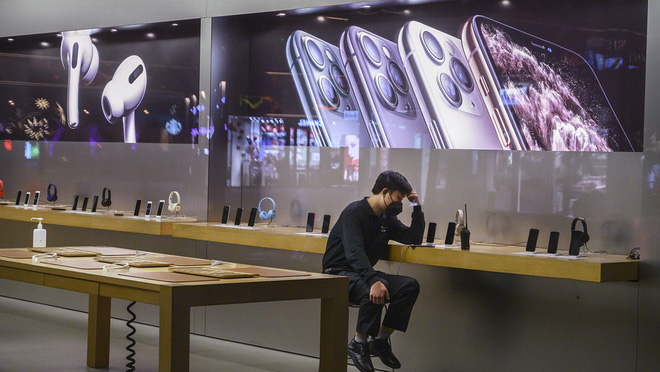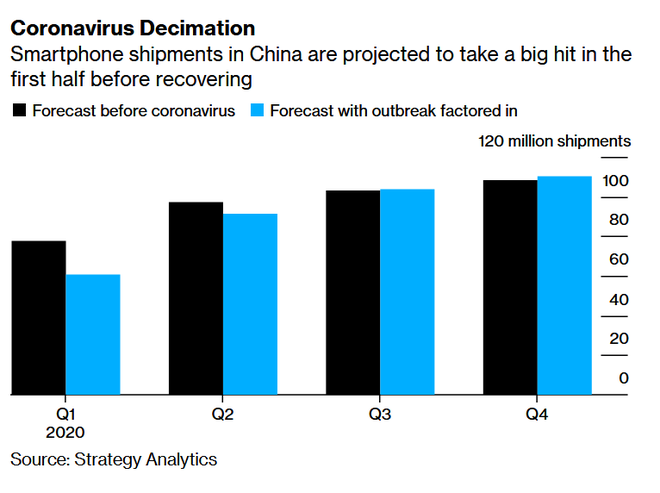Apple revised its earnings forecast to show that it is too dependent on the Chinese market
The first is the trade war between China and the US, and now the Corona virus outbreak - both of which have made us question the dependence of the world's most valuable consumer electronics manufacturer. into China, as a reliable market and also as a supply chain partner.
The Corona virus outbreak is choking every manufacturer and logistics service provider in China, and the supply chain and market demand for Apple products is no exception: Although its factories have returned to operation, they are still slower than expected, and most of the 42 Apple stores in the country also fell silent. All of this shows how Apple's business has been hit hard by incidents in the world's most populous country. The decline in sales in this market will almost immediately impact on the quarterly results, and the widespread stagnation in production lines is threatening to affect iPhone profits globally. for the next several months.
Amid the Corona virus outbreak, Apple is about to launch a new cheap iPhone, about $ 400. This model is still scheduled for release in March, though all plans may be changed at the last minute. Apple is also preparing to update iPad Pro models with a new camera system in the first half of 2020, and the Corona virus does not appear to have caused any delay or difficulty on these plans.
Since joining the company in the late 1990s, CEO Tim Cook has turned Apple's supply chain into a powerful force that will envy the industry. The company's products are made in China thanks to highly qualified but cheap human resources, and can be shipped around the world in just a few days. Based on Taiwan's Foxconn Technology Group in manufacturing operations, and China's heavily invested transportation system to ensure logistics, Apple has become a trillion-dollar company, primarily. Thanks to the sale of iPhone, iPad, Mac, and related components - all made in China.
Having created millions of jobs for Chinese people, Apple has also received the favor of the Chinese government, allowing them to penetrate so deeply that every American tech giant only dares to dream. OK. Facebook and Google both have to stand outside, looking greedy while Apple sells all sorts of devices in China. The group brings in more than US $ 40 billion a year from mainland China, behind only US and European markets. However, this advantage is also Apple's weakness.
On Monday, Apple lowered its earnings forecast for the first quarter of 2020 (ending March 31), which is longer than usual because of the unpredictability of the Corona virus. Apple futures and U.S. stock indexes of Apple suppliers, from Japan to Hong Kong, both fell after the announcement caused concern over the damage caused by the international cooperation and the system. Apple ecology. Last year, the company had to adjust its profit forecast because of iPhone demand in China, which it said was partly due to the ongoing trade war between the United States and China.
The stagnation in the production line at Apple's main iPhone factory in Zhengzhou could last into the second quarter of 2020 (ending June), and even longer. Foxconn just started recruiting seasonally on Monday, weeks behind schedule, and the company had to meet strict new regulations to curb the spread of Covid- 19 in his factories. An employer, who spoke on condition of anonymity, said the company currently only employs new workers in the Zhengzhou area, tightens all restrictions and is forced to ignore a huge number of workers waiting for work.

Having to segregate up to 14 days for workers returning to work from further provinces, Foxconn also faces challenges in managing the travel schedule of the management team. In Shenzhen, the company had to "cram" up to 10 workers into each room during the quarantine. The number of vacant beds is dwindling as the number of workers returning to work gradually increases.
The epidemic has caused factories across China to close unexpectedly for several weeks after the Chinese New Year holiday, and the worst nightmare that Foxconn and many other companies fear is the pandemic spread among factories, causing parts of the supply chain to freeze, thereby causing a more serious shortage. Apple's factories have reopened, but there's evidence that they haven't been operating at their full capacity before.
Retailers' existing inventory of iPhones will initially help to ease production bottlenecks, but analysts predict that soon, global stock availability will take place.
" I think we will start to see a shortage of iPhone in markets outside China, affecting profit forecasting " - Apple analyst Shannon Cross said. " In theory, this situation will not kill demand. It's simply that there will be more backlog that needs to be dealt with when the aforementioned issues are resolved ."
The immediate reaction to Apple lowering its profit forecast has caused the stock of technology companies in Asia to decline, especially those of Apple suppliers. But some implications for Apple have been widely anticipated before.
" We have seen nothing but articles about the virus for weeks. Starbucks has closed every store. Caterpillar has shut down factories. One company after another said the same thing." - Jim Paulsen , said an investment strategy expert at Lauthold Group. He expressed investors' optimism about a quick reversal: " We expect bad news about sales, which is not good, but not surprising."
Moving the entire production line out of China is impossible for Apple in the short term, given the size of its established networks, as well as the ability to leverage a workforce. to millions in this country. The major incidents that threatened the company's supply chain in 2018 and 2019, mainly stemming from the trade war, but Tim Cook's team remained consistent with the region and did not show any significant moves. Any involvement in a "mass evacuation".
" Apple's supply chain in China is so tight and so large that it will be difficult to repeat that as it moves out of the region," Cross said. " I think you will continue to see the company expand to India, but most of the production will still be in China."
Apple emphasized that its business is still good, that it is still on track to achieve predictable profits in areas outside of China for both its products and services. The company has implemented a long-term diversification plan, pouring billions of dollars to create its own streaming content for the Apple TV + service and build paid services like Apple Music and Apple Arcade. This is the company's most powerful move to reduce its dependence on the Chinese market to the present time: reduce the ratio of mere hardware sales to total revenue.
Speaking of the entire smartphone industry in China, Strategy Analytics last month forecast that the number of smartphones sold in the first half of 2020 will be significantly affected, then will recover and slightly increase in the months. end of the year. If Apple follows this trend, demand for the iPhone will likely increase in the last quarters of the year rather than plummeting throughout the year.

Forecast of the number of smartphones sold during the Corona virus: black is the prediction before the outbreak, blue is the forecast after the outbreak
" I think in the long run, Apple will maintain a very good position. There will be a little pressure on the value of the stock, but that is only the short-term effects, investors will overcome it." - Cross said.
You should read it
- ★ How the Chinese chip industry survived during the corona virus crisis
- ★ Hackers take advantage of the panic in the Corona virus epidemic to spread malware on the internet
- ★ The right way to wear a medical mask is to prevent and prevent Corona virus
- ★ Looking for solutions to corona virus toxicity: When do they cause death, when only cause flu?
- ★ Apple is about to launch iOS 7.0.5 exclusively for the Chinese market